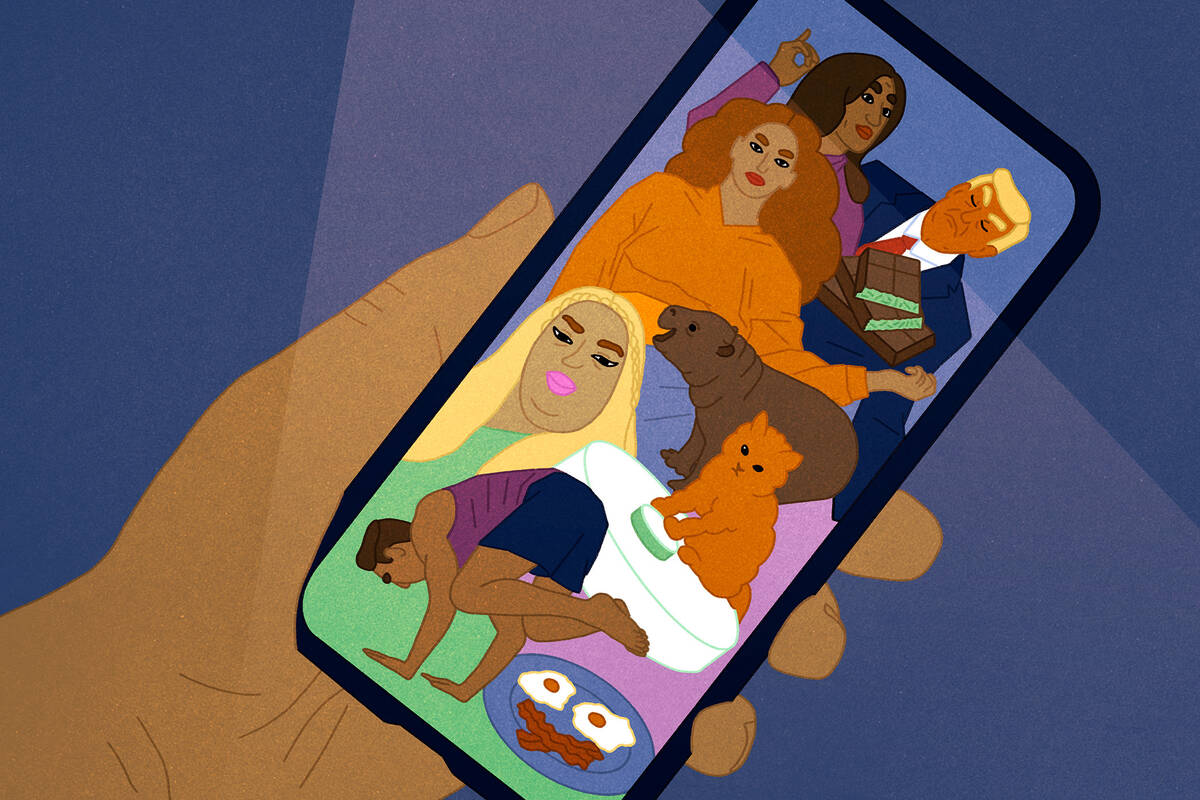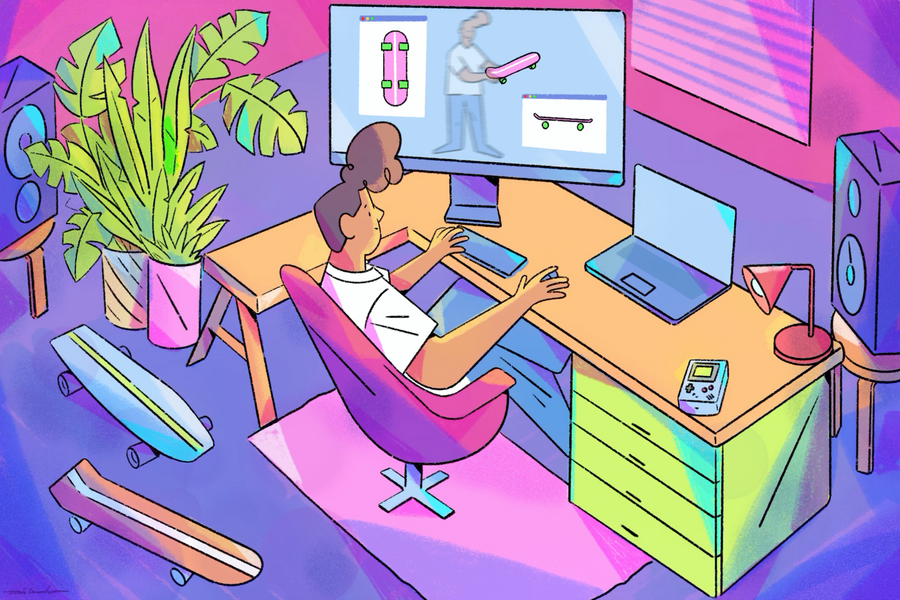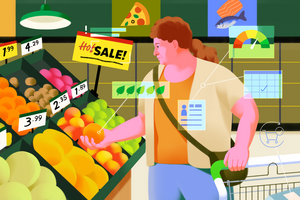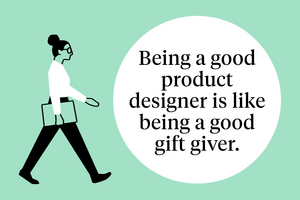Marketing Nov 1, 2025
Political News? Not in My Feed.
A new study of smartphone habits reveals that, in the runup to the 2024 U.S. presidential election, political content was mostly an afterthought.

Lisa Röper
In the run-up to the 2024 U.S. election, it may have seemed like political news was omnipresent. But in today’s fractured media landscape—where more people get information from their phones than newspapers and television—it’s harder than ever to gauge how much election information Americans actually consumed.
With an unprecedented dataset on the content people see on their phones, a team of researchers including Kellogg’s Guy Aridor was able to measure just how often people see election news. And the answer was so low they had to double-check their methods.
“For the first two months after we had gotten these results, we said there must be something wrong since the finding was so surprising,” says Aridor, an assistant professor of marketing.
On a typical day in fall 2024, the median individual in their study only encountered around 13 election-related keywords—less than half of what they’d encounter in reading a single news article. And of those encounters, only 5 percent came while viewing news apps or websites.
The researchers also sorted out how much of the observed inequality in this exposure was driven by systematic personal preference or the policy of apps such as Facebook and X to suppress or promote political content. While they confirmed that the amount of election news varied across these platforms, America’s meager political interest was mostly driven by people’s own phone habits.
“Everyone’s in kind of their own little world about the types of content that they see,” Aridor says. “People that use news apps actually seem to be getting reasonable amounts of news. It’s just that a lot of people that are spending time on Instagram, TikTok, or YouTube are occasionally running into [terms like] ‘Donald Trump’ and scrolling past it very fast, without getting much information. It is a little bit sobering.”
What people are really seeing on their phones
For their study, Aridor and colleagues Tevel Dekel, Rafael Jiménez-Durán, Ro’ee Levy, and Lena Song utilized a list of over 500 election terms (such as “vote,” “debate,” or “election”) and politicians’ names, including Donald Trump and Kamala Harris. They partnered with consumer-engagement company Screenlake to track how often these keywords appeared on several thousand Americans’ smartphones across all applications on their phone—including email, messaging, social-media, news, music and video, and browser apps. Whenever one of these terms appeared on the phone screen, Screenlake’s screen-management app counted it as an exposure.
This passive data collection was a leap forward from previous studies, Aridor says, which usually rely upon self-reported surveys or URL-based browser data on computers that often overstate news consumption.
Their study captured people’s exposure to the election terms from September to November 2024, with an average of 1,170 users per day.
In total, the median individual saw election keywords on their phone for only around 21 seconds each day—out of a daily average of five-and-a-half hours spent on their phone. Only about one in five participants viewed election content for over a minute daily.
Most people’s exposures to the keywords were also sprinkled throughout the day, not concentrated in a short period of time as you would expect from someone reading news stories.
“Apart from the very politically engaged, people don’t open the news at all,” Aridor says. “They’re getting election exposures sporadically throughout the day. So, the low amount of engagement that we find is not from intense bouts of political news consumption.”
The influencer effect
This low level of exposure remained steady over the three months of the study. Only two days saw a spike in election interest: the day of the presidential debate between Donald Trump and Kamala Harris and election day itself. On election day, most of the exposures occurred after polls had closed, suggesting that people were looking at results, not at information on how they should vote.
But there were specific events that did increase political exposure for certain groups. For example, people with higher-than-average exposure to the keyword “Taylor Swift” saw more political terms in the days after Swift’s Instagram endorsement of Kamala Harris.
“Despite the fact that we document these differences across apps, that’s actually not the main reason why people are not consuming political news. It’s because they apparently don’t want to.”
—
Guy Aridor
“For the median consumer, they seem to not be caring about these topics. But when it appears from someone relevant to them, like when someone follows Taylor Swift, that can actually lead to increased consumption,” Aridor says. “If people aren’t watching or reading the news, then whatever’s showing up on their social-media feeds is what’s popping up for them.”
The finding supports many election post-mortems that suggested politicians will need to rely less on traditional media or advertisements and more on celebrities and online influencers to raise their profile. Politicians in local congressional races—who rarely registered in the study’s data—stand to see the most benefit from this approach, Aridor says.
“I think if you can find a podcaster that is very popular in your area, that actually may be the only way that you can reach your constituents,” he says. “Basically, it’s a weird world now where these nonpolitical figures can actually make a difference, and I think a lot of politicians actually seem to be recognizing that.”
Platform vs. user effects
The researchers also examined whether policy decisions made by social-media platforms influenced people’s exposure to political information.
In 2024, Meta announced that they would stop recommending political posts to users of Facebook, Instagram, and Threads (a decision they would reverse in early 2025). Conversely, studies found that the X platform put more political content into its users’ feeds in the run-up to the election. Aridor and colleagues found that these policies did affect exposure to election content; regular Facebook and Instagram users saw fewer posts on politics, while people on X saw more (and around 43 times more content on owner Elon Musk).
But did these platform decisions explain the differences the researchers saw in election-related content consumption? Because they could monitor what people see across all their applications, they could tease out the influence of systematic differences in exposure across applications (the app effect) or across individuals (the individual effect). They found that, while there were meaningful app effects, individual effects by far dominate what people saw.
“Despite the fact that we document these differences across apps, that’s actually not the main reason why people are not consuming political news,” Aridor said. “It’s because they apparently don’t want to.”
That finding has significant implications for policymakers, who have considered regulating the algorithms on social-media platforms that control what users see. The problem, Aridor thinks, is much bigger than “censorship.”
“It would’ve been nice to say, ‘Oh, it’s just because Facebook is down-ranking news; that’s why people are not consuming it,’” he says. “Because that’s much easier to fix than figuring out why people don’t want to engage with the news.”
All the news that’s fit for you
Instead of actively suppressing political news or pushing particular points of view, social media and streaming content may have just become too efficient at giving people what they want.
“They’ve gotten really good at personalization to the point where they don’t even need you to give explicit signals of, ‘I’m following this person because I like this,’” Aridor says. “I think that change in the last four years has made a big difference in terms of the fragmentation of content.”
In one sense, this makes it easier than ever for people to find content on their favorite niche topic. But it may also be pushing people away from the information they need to keep up with candidates and issues and participate in democracy.
“If Facebook is making it so you’re not reading the news, and that makes you less informed—which changes how you vote and your political attitudes—that matters from a societal perspective,” Aridor says.
Rob Mitchum is the editor in chief of Kellogg Insight.
Aridor, Guy, Tevel Dekel, Rafael Jiménez-Durán, Ro’ee Levy, Lena Song. 2025. “Digital News Consumption: Evidence from Smartphone Content in the 2024 US Elections.” Working Paper.



